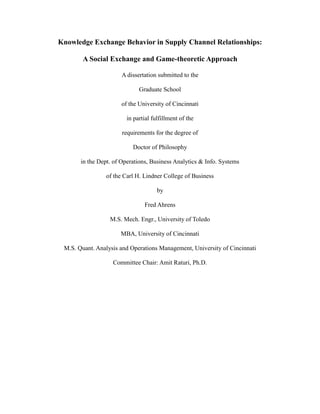
PhD_Thesis_Knowledge Exchange Behavior in Supply Channel Relationships
- 1. Knowledge Exchange Behavior in Supply Channel Relationships: A Social Exchange and Game-theoretic Approach A dissertation submitted to the Graduate School of the University of Cincinnati in partial fulfillment of the requirements for the degree of Doctor of Philosophy in the Dept. of Operations, Business Analytics & Info. Systems of the Carl H. Lindner College of Business by Fred Ahrens M.S. Mech. Engr., University of Toledo MBA, University of Cincinnati M.S. Quant. Analysis and Operations Management, University of Cincinnati Committee Chair: Amit Raturi, Ph.D.
- 2. Abstract Knowledge exchange behavior is often portrayed as a key determinant of the competitive position of a firm operating in a knowledge intensive environment. Of interest to researchers and managers alike are the conditions that promote, attenuate or even retard knowledge sharing between firms. This research employs a supply channel context to study knowledge exchange behavior (KEB). Whether knowledge exchange occurs, and if so, to what extent, may be contingent on various factors. While inter-organizational trust has widely been posited to be a key antecedent of knowledge exchange behavior, a review of the literature reveals that the evidence is conflicting. Sometimes a high level of inter-organizational trust may not be necessary for a decision to exchange valuable knowledge. Likewise, despite high inter-organizational trust KEB may not be present. A recent empirical study by Kim, Umanath, Kim, Ahrens & Kim, (2012) found that increasing levels of inter-organizational trust actually resulted in inhibition of knowledge exchange behavior in supply channel dyads even with a high level of knowledge complementarity. This specific finding has served as the springboard for this project; that is, this inquiry is focused on identifying conditions that render inter-organizational trust unimportant. In short, this research seeks to examine the contingent effect of knowledge interdependence (joint dependence + dependence asymmetry) on KEB – speculated to be a missing contingency by Kim, et al (2012). In this research project, the role of inter-organizational trust is examined by using game theory to characterize the incentives associated with knowledge sharing. Social exchange theory, along with the relational and social capital perspectives, is used to complement the game-theoretic view by characterizing the behavioral implications of the incentive structure for each actor in a supply channel dyad.
- 3. A research model is proposed and tested using data obtained in a lab experiment conducted at two sites. The findings suggest that inter-organization trust has little, if any, effect on knowledge sharing behavior when interdependence is high or low. However, the impact of inter- organizational trust on knowledge exchange behavior is significant when interdependence is moderate. The theorized role of dependence asymmetry in the research model is not empirically supported. An ex post analysis sheds some light on the effect of dependence asymmetry in the model. Keywords: Knowledge exchange, Supply chain management, Knowledge complementarity, Interdependence, Inter-organizational trust, Game theory, Social exchange theory, Relational view, Social capital